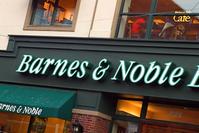 Wall Street liked the announcement that Barnes & Noble chairman Len Riggio wants to buy the general retail part of the business: yesterday--when the Dow Jones fell 1.55%--B&N's stock rose 11.57%, to $15.06.
Wall Street liked the announcement that Barnes & Noble chairman Len Riggio wants to buy the general retail part of the business: yesterday--when the Dow Jones fell 1.55%--B&N's stock rose 11.57%, to $15.06.
As a result, B&N is now valued at about $900 million, which is substantially less than the $1.8-billion valuation for its Nook Media division alone that was made last year when Microsoft and Pearson invested in the business. Analysts' estimates of the value of B&N's retail operations--primarily 689 stores--range from $484.5 million to more than $1 billion, according to the New York Times. A "person close to the company" said that B&N would be "hard pressed" to accept less than $1 billion for its retail stores.
The Wall Street Journal noted that Riggio's SEC filing says an offer would "consist primarily of cash and the assumption of certain liabilities" and he would "arrange any debt financing required." Morningstar analyst Peter Wahlstrom told the Journal that Riggio could exchange his third ownership in B&N as "part payment" for the stores. Then again, Wahlstrom said, "I think he's got plenty of personal wealth and connections that would support financing for the retail business." Riggio has a lot of experience selling his privately owned companies to his publicly owned companies, then sometimes taking those purchased companies private again and then selling them back to his publicly held companies, often making significant amounts of money on each deal. Examples include B&N.com and various game retailers--GameStop, Funcoland, Babbage's and Software Etc. The most recent case was B&N College, which Riggio owned privately and sold to B&N in 2009 for $596 million, a price that was the subject of lawsuits by other B&N shareholders who alleged that Riggio had B&N overpay for the college store company. Last year, Riggio settled a combined suit just before trial, agreeing to a $29-million reduction in the price B&N would pay for B&N College.
Riggio has a lot of experience selling his privately owned companies to his publicly owned companies, then sometimes taking those purchased companies private again and then selling them back to his publicly held companies, often making significant amounts of money on each deal. Examples include B&N.com and various game retailers--GameStop, Funcoland, Babbage's and Software Etc. The most recent case was B&N College, which Riggio owned privately and sold to B&N in 2009 for $596 million, a price that was the subject of lawsuits by other B&N shareholders who alleged that Riggio had B&N overpay for the college store company. Last year, Riggio settled a combined suit just before trial, agreeing to a $29-million reduction in the price B&N would pay for B&N College.
Yesterday, B&N said that it has set up a special committee of independent board members to evaluate the Riggio proposal.
Many people in the industry welcomed Riggio's move to purchase B&N's stores, believing that the traditional bookselling operations of the company have been neglected by management that has been focused on the digital side of the business. Who better to save B&N that the man who originally built the company into a bookselling powerhouse?

